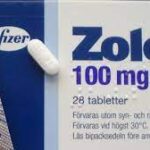5 Facts About The Zoloft While Breastfeeding Lawsuits

Zoloft is a brand name for the antidepressant medication sertraline. It belongs to a class of drugs called selective serotonin reuptake inhibitors (SSRIs). It is used to treat a variety of mental health conditions, including depression, anxiety, and obsessive-compulsive disorder (OCD). The drug works by increasing the levels of the neurotransmitter serotonin in the brain, which is believed to improve mood and reduce symptoms of anxiety and depression.
Serotonin is a chemical messenger that plays a key role in regulating mood, appetite, and sleep. In people with depression or anxiety, there is often a deficiency of serotonin in the brain. SSRIs like Zoloft work by inhibiting the reuptake of serotonin, which means that the neurotransmitter remains in the brain for longer and can more effectively bind to serotonin receptors, leading to an improvement in mood.
Zoloft was first developed by the pharmaceutical company Pfizer in the late 1970s and was approved by the US Food and Drug Administration (FDA) for the treatment of major depressive disorder in 1991. Since then, it has been approved for a range of other uses, including the treatment of OCD, panic disorder, PTSD, social anxiety disorder, PMDD, and generalized anxiety disorder.
Zoloft is typically taken orally in tablet form, and the dosage can vary depending on the condition being treated and the patient’s individual needs. The medication is generally well-tolerated, although some people may experience side effects such as nausea, dizziness, and sleep disturbances.
Despite becoming a widely recognized and trusted brand name in the field of mental health, and one of the most commonly prescribed antidepressants in the United States, There have been controversies related to the use of Zoloft during breastfeeding. In this article, we shall be taking an in-depth look at the Zoloft while breastfeeding lawsuits.
The Zoloft While Breastfeeding Lawsuits
In recent years, there have been several lawsuits filed against the makers of Zoloft, Pfizer Inc., by mothers who claim that taking the drug while breastfeeding caused harm to their babies. The lawsuits allege that Pfizer failed to adequately warn patients about the risks associated with taking Zoloft while breastfeeding.
Studies have shown that sertraline can be detected in breast milk, and there is some evidence to suggest that it may have adverse effects on infants. For example, one study published in the Journal of Clinical Psychiatry found that infants exposed to sertraline through breast milk had lower levels of serotonin in their blood, which can affect mood, appetite, and sleep.
Other studies have suggested that infants exposed to sertraline through breast milk may be at increased risk of developing certain health conditions, such as gastrointestinal disorders and respiratory infections.
In response to these concerns, the US Food and Drug Administration (FDA) issued a warning in 2006 advising healthcare providers to weigh the potential risks and benefits of using Zoloft in breastfeeding mothers.
Pfizer has maintained that Zoloft is safe and effective when used as directed, and that the company has adequately warned patients about the potential risks associated with the drug.
The lawsuits against Pfizer seek compensation for medical expenses, lost wages, pain and suffering, and other damages related to the alleged harm caused by Zoloft while breastfeeding. The exact number of lawsuits involving Zoloft and breastfeeding is difficult to determine because new lawsuits may still be filed, and some cases may have been settled or dismissed. However, according to some sources, there have been thousands of lawsuits filed against Pfizer Inc. related to Zoloft and breastfeeding. The exact number of cases and their status can vary by jurisdiction, and the legal process is ongoing.
The total amount of damages sought in the Zoloft and breastfeeding lawsuits is huge because it can vary by case and jurisdiction. However, some sources suggest that the total damages sought by all plaintiffs in these cases could potentially reach hundreds of millions or even billions of dollars. The final amount, if any, awarded will depend on various factors, such as the severity of the alleged harm caused by the drug and the strength of the evidence presented by both parties.
In addition to the side effects during breastfeeding, there have been several studies that have suggested a possible link between Zoloft (sertraline) use during pregnancy and an increased risk of certain birth defects. Some of the most commonly reported birth defects associated with Zoloft use during pregnancy include:
1. Heart defects: Studies have suggested that infants exposed to Zoloft during the first trimester of pregnancy may be at an increased risk of developing heart defects, such as atrial or ventricular septal defects.
2. Lung defects: Some studies have also suggested that infants exposed to Zoloft during pregnancy may be at an increased risk of developing lung defects, such as persistent pulmonary hypertension of the newborn (PPHN).
3. Cranial defects: Infants exposed to Zoloft during pregnancy may also be at an increased risk of developing cranial defects, such as craniosynostosis or anencephaly.
4. Limb defects: Some studies have suggested that Zoloft use during pregnancy may be associated with an increased risk of limb defects, such as clubfoot.
It is important to note that the actual risk of birth defects associated with Zoloft use during pregnancy is relatively low. However, healthcare providers should weigh the potential risks and benefits of using Zoloft during pregnancy and discuss the available options with their patients. Women who are pregnant or planning to become pregnant should always consult their healthcare provider before taking any medications.





